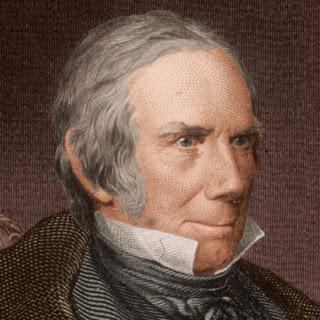 "I would rather be right than be president!" Henry Clay (1777-1852) thundered near the end of his life. The record suggests otherwise. A constant candidate who won presidential nomination three times (in 1824, 1832 and 1844), Clay's ambitions for America's highest office were obvious, undisguised, overweening. His formidable accomplishments as a statesman (Speaker of the House, Senator from Kentucky, Secretary of State) are blotted by his presidential failure.
"I would rather be right than be president!" Henry Clay (1777-1852) thundered near the end of his life. The record suggests otherwise. A constant candidate who won presidential nomination three times (in 1824, 1832 and 1844), Clay's ambitions for America's highest office were obvious, undisguised, overweening. His formidable accomplishments as a statesman (Speaker of the House, Senator from Kentucky, Secretary of State) are blotted by his presidential failure.In a less reflective mood, Clay proclaimed "My friends are not worth the powder and shot it would take to kill them!" This after the Whig Party, which he founded and guided through most of its brief existence, rejected his 1840 bid in favor of William Henry Harrison, who repaid their kindness by dying a month after taking office. Clay only won nomination when he stood little chance of success - in 1824 against a crowded field, in 1832 against Andrew Jackson, in 1844 against James K. Polk.
How could such a giant fail to achieve the Presidency? A brilliant orator who captivated friend and foe alike, a visionary who imagined an American System of highways and improvements, a unionist who worked two miracle compromises between slave and free states, he towered over the failures who peopled the antebellum White House. What's obvious to 21st Century observers wasn't so obvious to his contemporaries, who couldn't forgive Clay his role in one of America's most controversial elections.
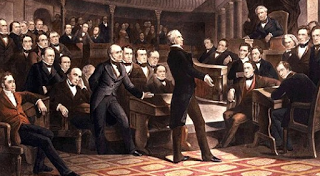
Finest hour: Clay addressing the Senate, 1850
In 1824, America seemed shrouded in the Era of Good Feelings. Four years earlier, James Monroe won reelection unopposed. His administration was peaceful and productive, devoting itself to domestic improvements and foreign diplomacy. Secretary of State John Quincy Adams negotiated treaties with Britain and Spain while proclaiming the Monroe Doctrine, casting American protection (or hegemony) over South America's fledging nations. In Congress, Henry Clay helped negotiate the Missouri Compromise, postponing civil war over slavery.Yet Monroe's succession promised an end to nonpartisan bonhomie. Clay was one candidate, along with Adams and William Crawford, Monroe's Secretary of War. John Calhoun, the firebrand South Carolinian, contemplated running then settled for Vice President. The wildcard was Andrew Jackson, recently elected Senator from Tennessee, but still the hero of the Battle of New Orleans. Where his opponents cast themselves as seasoned statesmen, Jackson ran as an outsider above Beltway pettiness.
"Look to the City of Washington, and let the virtuous patriots of the country weep at the spectacle," crowed Jackson's associate, John Eaton. "There corruption is springing into existence, and fast flourishing." Who better to clean up Washington than Jackson, who vanquished the British, the Creek and Seminole Indians with ruthless dispatch? Jackson proclaimed the election "a contest between a few demagogues and the people," casting himself on the latter's side.
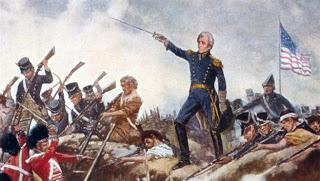
Military Chieftain: Andrew Jackson at New Orleans, 1815
Clay viewed Jackson with contempt, dismissing him as a "military chieftain" and a would-be Caesar: "I cannot believe that killing 2500 Englishmen at N. Orleans qualifies for the various, difficult and complicated duties of the Chief Magistracy." Certainly Jackson's famously violent temper, which triggered duels, brawls and lasting grudges with rivals, seemed a disqualification. Who wanted an impulsive hothead in the White House?Jackson and Clay first clashed over Old Hickory's unauthorized invasion of Spanish Florida in 1818, hanging two British subjects and nearly precipitating war. While Monroe, Adams and Crawford rallied around the general, Clay savaged him before Congress. He proclaimed Jackson's action "a triumph of the military over the civil authority over the constitution of the land." This attack triggered a feud that dominated the next quarter century of American politics.
And Clay's record wasn't spotless, either. He was a renowned gambler and ladies' man, fond of drink and with his own history of dueling, including a showdown with Virginia Congressman John Randolph. Adams proclaimed Clay "void of good morals, and... politically a reckless demagogue," while others found his undisguised yearning for the Presidency unseemly. Richard M. Johnson, a fellow Kentuckian, declared Clay "the most imprudent man in the world."
With no candidate likely to win an outright majority of Electoral Votes, the race would devolve into a runoff election in the House of Representatives between the top three vote getters. Then Clay, as Speaker of the House, could maneuver and cajole his way into the White House. But fate had numerous nasty surprises in store, both for Clay and his rivals. Nothing was certain in 19th Century politics.
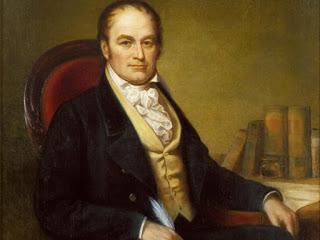
William H. Crawford
Many considered William H. Crawford, a seasoned and devious politician, the early front-runner. A former Georgia Senator, he'd nearly bested Monroe eight years prior and still commanded a strong Congressional base. But Crawford suffered a stroke in July 1823, triggered by digitalis prescribed by a careless doctor. Crawford survived and remained a nominal candidate, but few expected this enfeebled man, half-paralyzed and blind in one eye, to be a serious contender.Nonetheless, Crawford remained a hindrance to his rivals. In these days when popular votes were negligible, wooing state legislators and individual electors proved more important than courting the public. Here Clay and Adams might be expected to excel, but Jackson had a strong political machine in Tennessee which organized support in the western states. With Adams monopolizing the Northeast, Clay had little room to maneuver. It seemed likely that whoever pried Crawford's stubborn delegates away would win.
Clay focused on wooing delegates in New York, where Senator Martin Van Buren held sway. Van Buren backed Crawford despite his incapacity, and resisted Clay's entreaties for support. For his part, Clay spurned an alliance with Adams to checkmate Crawford, vowing that "If I am elected, I shall enter upon the office without one solitary promise or pledge to any man." A laudable statement of principle, utterly unsuited for this buffet of backstabbing.
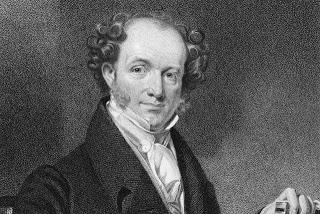
Martin Van Buren, Machiavellian
By November 1824, as New York's legislature met to cast their ballots, Van Buren and Clay reached a rapprochement, Clay vowing to support Crawford if his candidacy faltered, and vice versa. Then Van Buren double-crossed Clay, ordering his faction to support Adams instead. The plot backfired, as Clay's men also switched votes to Adams. Thus Adams secured 26 of New York's 36 electoral votes without lifting a finger, allowing his rivals to destroy each other.Now Clay leaned on Louisiana to remain in contention. But Jackson remained a legend there for defending New Orleans, his popularity combining with maneuvering and happenstance. Two Clay supporters were injured in a riding accident, allowing Jackson to win three of the state's five electoral votes. The Argus of Western America summarized the kerfuffle: "The strongest man in the state [Clay] got no votes at all, the weakest [Adams] got two. Such is the consequence of political barter."
By the time ballots were counted in December, Clay was aghast. As predicted, the Electoral College stood deadlocked: Jackson earned 90 electoral votes, Adams 81, ensuring further balloting in the House of Representatives. But Crawford managed 41 electoral votes between New York and assorted southern states, leaving Henry Clay with just 37. That disqualified Clay from the resultant runoff election, a colossal embarrassment to a normally shrewd operator.
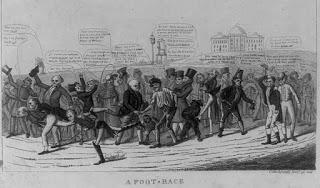
In January 1825, Clay attended a dinner party where Adams and Jackson sat at the same table, separated by an empty chair, refusing to acknowledge each other. Clay strode up to his erstwhile rivals and cracked, "Since you are both so near the chair, but neither can occupy it, I will slip in between you, and take it myself." Onlookers laughed, but Adams and Jackson failed to see the humor.
Ultimately, Clay decided to support Adams. While Clay and Adams had sniped over foreign policy issues over the previous years, they lacked the deep personal enmity that Clay and Jackson entertained. He felt that electing a man like Jackson "would be a precedent fraught with much danger to the character and security of our institutions." He also thought that Adams, crabbed and dyspeptic though he was, hewed close enough to his American System to be a suitable ally.
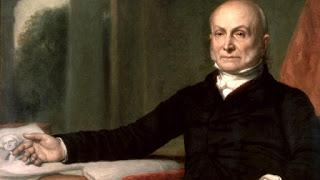
John Quincy Adams
After several contacts through an intermediary, Adams and Clay met on January 9th. Understandably, both men were circumspect about the substance of their conversation. Adams later commented that Clay "wished me...to satisfy him with regard to some principles of great public importance, but without any personal considerations for himself." Clay only admitted that Adams promised him "a prominent place in the Administration." Whether the men struck an explicit deal, there was every appearance of impropriety.Within weeks, word of the meeting leaked out, with the Philadelphia Columbia Observer accusing a "corrupt bargain" wherein Adams would appoint Clay Secretary of State in exchange for his support. Clay challenged the paper's source (Congressman George Kremer of Pennsylvania) to a duel, which led to increased ridicule and suspicion. Clay ultimately ordered a House investigation into the charge, which found no evidence; but then, how like would they find evidence against their own Speaker?
When Congress voted on February 9th, 1825, the outcome was preordained. Despite last minute maneuvering by Jackson and Crawford's supporters, Adams prevailed in the House. John Randolph, Clay's old foe and a Jackson supporter, announced "The deck was stacked!" Jackson's nephew, Andrew Jackson Donelson, claimed that "Every corrupt act was employed to draw the representatives from their responsibility to their constituents."
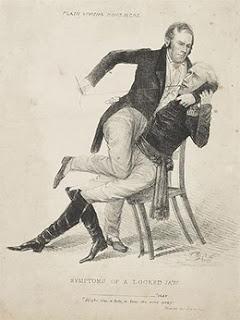
Clay and Jackson
As for Jackson, he initiated a savage campaign against Clay, speaking and encouraging his surrogates and newspaper supporters to echo the Corrupt Bargain charge. "The Judas of the West has closed the contest and will receive the 30 pieces of silver," Jackson growled; "his end will be the same." Jackson was right: Clay became Adams' Secretary of State, and thereby forfeited his presidential prospects.Adams worried that victory as a minority president "would open [me] to a far severer trial than defeat." Adams entered office under a cloud of illegitimacy; his administration, though far-reaching and ambitious, proved largely inert and ineffective, while Clay became an undistinguished Secretary of State. Jackson returned in four years, defeating Adams in the ugliest presidential campaign to date and ushering in the Jacksonian Era of (white middle class) popular democracy.
Clay ran for president in seemingly every election afterwards. In 1832 he earned the nomination of the National Republicans, fighting Jackson over the Bank of the United States and Indian Removal, but lost in a landslide. He lost the Whig nomination to William Henry Harrison (another military chieftain!) in two subsequent elections, and clashed with John Tyler, who proved a Whig in name only. In 1844 he won again, only to find the stain of his "bargain" again weighting him down. He lost to James K. Polk, who led the US into war with Mexico.
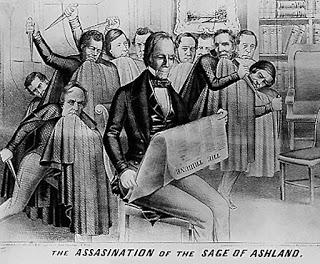
Henry Clay gets no respect, even from his fellow Whigs
Perhaps Clay's very remarkability weighed against him. The pro-Polk Richmond Enquirer announced that "we do not want splendid eloquence to conduct the executive department...We do not want any high flying and daring politician, who soars even beyond the constitution." Better to have a mediocrity with a common touch than a skilled politician with overweening ambition. Clay ended his days as a principled critic of the Mexican War, and crafted the Compromise of 1850 in one last effort to avert civil war. He died, mourned by all but unable to escape his reputation."The more Clay denied the corrupt bargain charges," Robert V. Remini wrote, "the more people disbelieved him and condemned his betrayal." We can't even know for sure whether there was a corrupt bargain. Two such shrewd politicians as Adams and Clay needn't have struck an explicit bargain; an implicit understanding would have sufficed. Still, the unshakeable appearance of impropriety, rather than proven misconduct, prevented him from obtaining the office whose achievement animated his career.
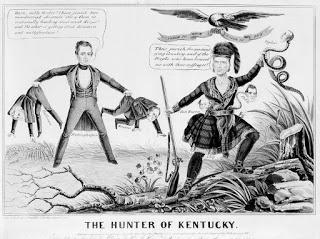
My portrait of Clay draws mainly from David S. Heidler and Jeanne T. Heidler's Henry Clay: The Essential American (2010) and Robert V. Remini's Henry Clay, Statesman for the Union (1991). Daniel Walker Howe's The Political Culture of the American Whigs (1977) and Irving Stone's They Also Ran (1944) provide shorter sketches; Howe is highly favorable towards Clay, Stone extremely critical.
For Adams, I consulted Paul C. Nagel, John Quincy Adams: A Public Life, a Private Life (1999) and James Traut, John Quincy Adams: Militant Spirit (2016); for Jackson, H.W. Brands, Andrew Jackson: His Life and Times (2005) and Remini, The Life of Andrew Jackson (1987). Howe's What Hath God Wrought: The Transformation of America, 1815-1848 (2008) provides superb background on the era's politics and culture.
Other articles on American history:
- Eugene McCarthy Versus the Democratic Party, 1968
- George Wallace Stands Up For America, 1968
- Nelson Rockefeller and the Demise of the Liberal Republican
- Richard Nixon's Deplorables
- Spiro Agnew Grooves On
- William Scranton for President, 1964
- William Scranton for President, 1964: Part Two

